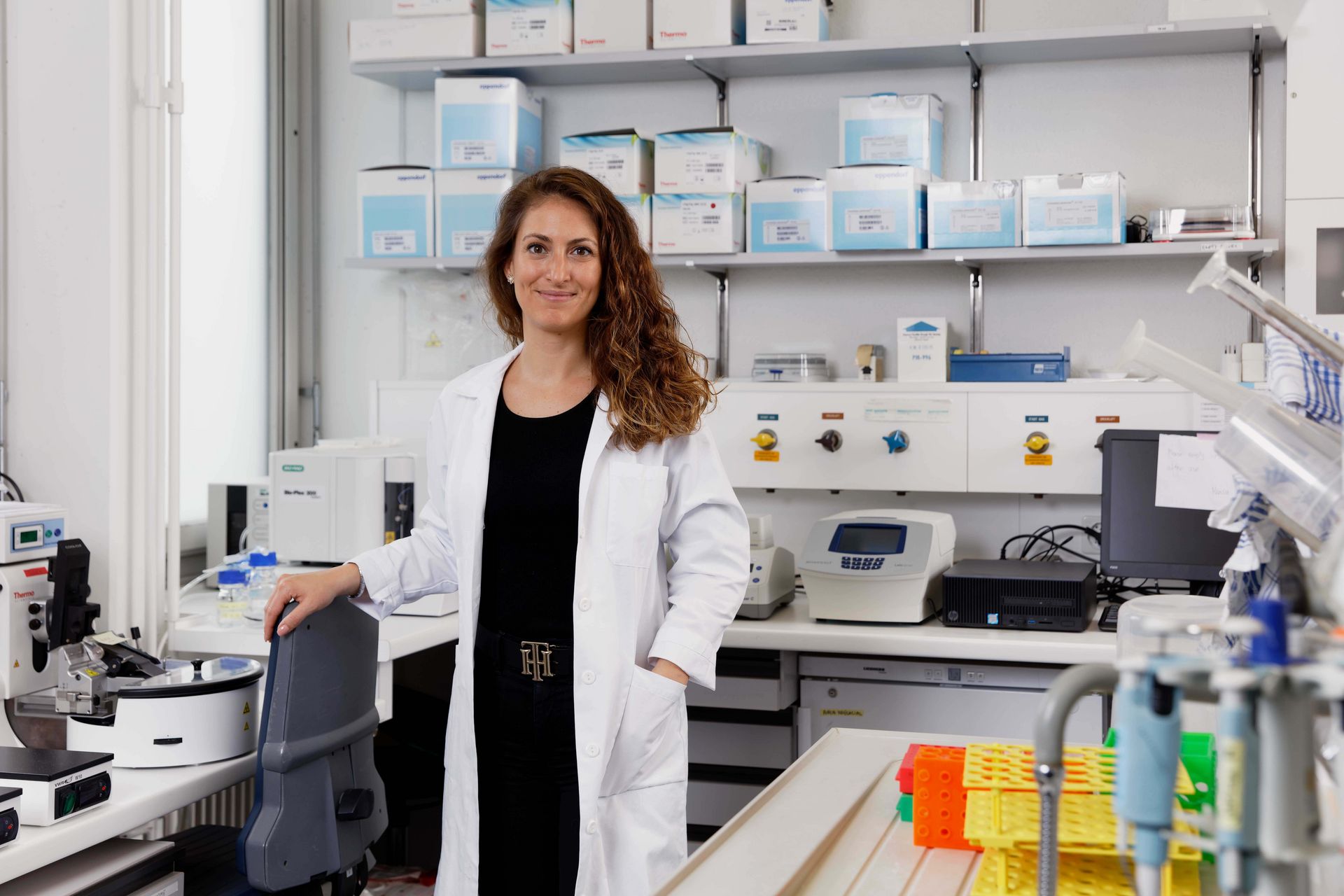News

Gut bacteria to treat cancer
Molecular biologist Ana Montalban-Arques is preparing her novel colon cancer treatment for market entry—thanks to a MedTechEntrepreneur Fellowship from the University of Zurich.
The millions of miniscule but powerful microbes that inhabit our body and gut—collectively known as the microbiome—have long been a source of fascination for Dr Ana Montalban-Arques. Ever since her first in-depth study of microbes for her master’s thesis over ten years ago, her interest in intestinal bacteria has grown steadily. “Science is increasingly showing the extraordinary effect that these microscopic organisms have on our bodies,” says the postdoctoral researcher. “Microbes don’t just help us digest food—they also fortify our immune system.”
From Spain to Switzerland
After studying molecular biology in her homeland of Spain and completing her PhD in Austria, Montalban-Arques took on a postdoctoral position in 2018 in microbiome research at the University of Zurich (UZH) and the University Hospital Zurich. With her team, she has demonstrated that patients with colorectal cancer—the most common form of colon cancer—have a different composition of gut microbiome compared to healthy persons: they lack sufficient bacteria from the Clostridiales order. When Clostridiales bacteria are administered to mice with colon cancer, their immune system becomes strong enough to effectively attack the tumour—with no side effects whatsoever. Moreover, her team has proven that the treatment is effective not only for colon cancer—the bacteria can also activate immune cells to combat tumours in skin, breast and lung cancer.
Promising bacterial mix
These results bode well for the future, especially as a considerable percentage of cancer patients respond poorly to current treatments or suffer a relapse—a situation that inspired Montalban-Arques to venture into entrepreneurship and translate her research results into patient care. Supported by her professor, Michael Scharl, she successfully applied for a UZH MedTechEntrepreneur Fellowship; now she has until March 2022 to prepare for her future role as entrepreneur and CEO of “Recolony”, her spin-off company.
“There’s much to learn, as the world of entrepreneurship is new to me,” she says. The MedTechEntrepreneur Fellowship, which is financed by the Werner Siemens Foundation, will support her project with coaching, networking events and entrepreneurial know-how, including information about patents and regulatory procedures for pharmaceutical products.
The next step for the team on the path to a marketable product is to produce the bacterial mix in freeze-dried capsules that are simple to administer. In the best-case scenario, the mix will form the first-ever cancer therapy that not only uses bacteria to enhance the effectiveness of other immunotherapies, but in which the microbiome itself functions as a stand-alone immunotherapy. Ultimately, the Clostridiales bacterial mix could help heal colon cancer, stop relapses from occurring and prevent the growth of tumours in at-risk persons.
Effective against various cancers
In addition to professional support, the MedTechEntrepreneur Fellowship from UZH includes a grant of 150 000 Swiss francs, which Montalban-Arques will use to finance the production of the bacterial mix. Her project is also supported by the Swiss National Science Foundation.
Should the clinical trials go according to plan, the medication will be ready for market in 2030. But Montalban-Arques already has a greater vision: “My aim is to develop specific bacterial mixes as an immunotherapy for different types of cancer.”
Cultivating networks
Ana Montalban-Arques is one of thirteen MedTechEntrepreneur Fellows. Since the launch of the programme in 2018, twenty-eight junior researchers have submitted applications, and six new companies have already been established. “Covid-19 couldn’t put a dent in our will to found companies,” says Michael Schaepman, President of UZH and former head of the fellowship programme. “The fellowship holders have overcome the challenges posed by the pandemic. And they’ll benefit in future from this unforeseen experience.”
The pandemic has underscored the value of mutual support and knowledge exchange among the fellowship holders, as they often face similar challenges, such as how to build a team or finance their company. “With the increasing number of current and completed projects, it’s becoming more and more important to promote networking among the fellows,” says Schaepman. Plans are under way not only to expand networking opportunities among current fellows, but also to establish exchange with former fellowship holders. Indeed, their know-how and experiences are invaluable for future entrepreneurs.
Text: Adrian Ritter
Photos: Oliver Lang